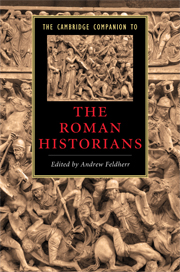Book contents
- Frontmatter
- Introduction
- Part I Approaches
- Part II Contexts and Traditions
- 4 Alternatives to written history in Republican Rome
- 5 Roman historians and the Greeks: Audiences and models
- 6 Cato’s Origines: The historian and his enemies
- 7 Polybius
- Part III Subjects
- Part IV Modes
- Part V Characters
- Part IV Transformations
- Chronological list of the historians of Rome
- Bibliography
- Index
7 - Polybius
from Part II - Contexts and Traditions
Published online by Cambridge University Press: 28 November 2010
- Frontmatter
- Introduction
- Part I Approaches
- Part II Contexts and Traditions
- 4 Alternatives to written history in Republican Rome
- 5 Roman historians and the Greeks: Audiences and models
- 6 Cato’s Origines: The historian and his enemies
- 7 Polybius
- Part III Subjects
- Part IV Modes
- Part V Characters
- Part IV Transformations
- Chronological list of the historians of Rome
- Bibliography
- Index
Summary
Both pivotal and celebrated, Polybius of Megalopolis looms large on the isthmus that divides and connects Greek and Latin historiography. Firmly embedded in the genealogy of Greek historians, the methodological heir of Thucydides, a continuator of the great third-century Sicilian historian Timaeus, his impact on later writers of all kinds, both Greek and Roman, is unusually demonstrable; few historians cite so often or so extensively the work of their predecessors, fewer of those are themselves so often cited. Polybius compared the ideal historian with itinerant Odysseus (12.27.10-28.1), and, like his hero, he did indeed wander around the Mediterranean from Spain to Alexandria, seeing for himself. But at times he seems more like Cercyon blocking the Isthmian road, ever ready to wrestle with his predecessors, and intimidating those who wrote after him, the intersection of a “two-way shadow” thrown by the light of posterity: casting a shadow, cast in shadow. Even so learned and assured a writer as Strabo is circumspect when rising to correct him: “Someone could say, 'My dear Polybius. . .'” More than a mere historian he is himself “un fait culturel,” positioned between Greece and Rome by his biography and his Bildung as much as by his subject matter, a Romanizer in his vocabulary and, strikingly, his syntax, he was also a paradigmatic captive Greek who captivated his Roman conquerors.
- Type
- Chapter
- Information
- The Cambridge Companion to the Roman Historians , pp. 123 - 136Publisher: Cambridge University PressPrint publication year: 2009
- 2
- Cited by

